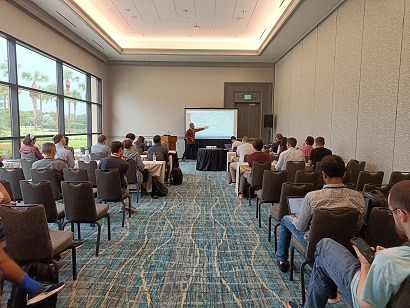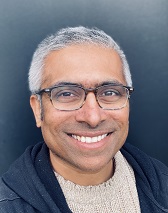
News: The paper “HWASanIO: Detecting C/C++ Intra-object Overflows with Memory Shading” by Konrad Hohentanner, Florian Kasten and Lukas Auer (Fraunhofer AISEC) won the best paper award! Congratulations!
Static and dynamic analysis techniques and tools for mainstream programming languages (such as Java, C, JavaScript), have received widespread attention for a long time. The application domains of these analyses range from core libraries to modern technologies such as web services and mobile applications. Over time, various analysis frameworks have been developed to provide techniques for optimizing programs, ensuring code quality, and assessing security and compliance.
The 12th ACM SIGPLAN International Workshop on the State Of the Art in Program Analysis (SOAP 2023) aims to bring together the members of the program analysis community to share new developments and shape new innovations in program analysis.
For SOAP 2023, we invite contributions from researchers and practitioners working with program analysis. We are particularly interested in exciting analysis framework ideas, application of existing static analysis techniques to industrial software, adoption of static analysis in software engineering practices (such as DevOps), innovative designs, and analysis techniques, including preliminary results or work in progress. We will also focus on the state of the practice for program analysis by encouraging submissions by industrial participants, including tool demonstration submissions. The workshop agenda will continue its tradition of lively discussions on extensions of existing frameworks, the development of novel analyses and tools, and how program analysis is used in real-world scenarios.
Papers can be submitted through EasyChair.
The expected format of the workshop will be: a full-day workshop, on Saturday, June 17th, 2023, with:
- 3 invited talks by leading members of the program analysis community,
- presentations of all accepted refereed papers, and
- time for discussion.
Invited Speakers
 |  |  |
|---|---|---|
| Tucker Taft (Adacore) | Ranjit Jhala (UCSD) | William Hallahan (Binghamton University) |
| Sound and Precise Static Analysis using a generalization of Static Single Assignment and Value Numbering | Flux: Refinement types for Rust | Applications of Symbolic Execution |
Sat 17 JunDisplayed time zone: Eastern Time (US & Canada) change
09:00 - 11:00 | SOAP: Session 1 - Static AnalysisSOAP at Magnolia 18 Chair(s): Vincenzo Arceri University of Parma, Italy | ||
09:00 30mTalk | Combining E-Graphs with Abstract Interpretation SOAP Samuel Coward Imperial College London, UK / Intel Corporation, George A. Constantinides Imperial College London, UK, Theo Drane Intel Corporation, USA DOI | ||
09:30 30mTalk | Static Analysis of Data Transformations in Jupyter Notebooks (Virtual) SOAP Luca Negrini Ca’ Foscari University of Venice, Corvallis S.r.l., Guruprerana Shabadi École Polytechnique, Institut Polytechnique de Paris, Caterina Urban Inria & École Normale Supérieure | Université PSL DOI | ||
10:00 30mTalk | Speeding up Static Analysis with the Split Operator SOAP Vincenzo Arceri University of Parma, Italy, Greta Dolcetti University of Parma - Department of Mathematical, Physical, and Computer Sciences, Enea Zaffanella University of Parma, Italy DOI | ||
10:30 30mTalk | When Long Jumps Fall Short: Control-Flow Tracking and Misuse Detection for Non-local Jumps in C SOAP Michael Schwarz Technische Universität München, Julian Erhard Technical University of Munich, Vesal Vojdani University of Tartu, Simmo Saan University of Tartu, Estonia, Helmut Seidl Technische Universität München DOI Media Attached | ||
11:20 - 12:30 | |||
11:20 25mTalk | HWASanIO: Detecting C/C++ Intra-object Overflows with Memory Shading SOAP DOI | ||
11:45 45mKeynote | Flux: Refinement types for RustInvited Talk SOAP Ranjit Jhala University of California at San Diego | ||
14:00 - 15:30 | SOAP: Session 3 - Scalable AnalysisSOAP at Magnolia 18 Chair(s): Pietro Ferrara Università Ca' Foscari, Venezia, Italy | ||
14:00 40mKeynote | Sound and Precise Static Analysis using a generalization of Static Single Assignment and Value Numbering (Virtual)Invited Talk SOAP Tucker Taft AdaCore, United States | ||
14:40 25mTalk | Extensible and Scalable Architecture for Hybrid Analysis SOAP DOI | ||
15:05 25mTalk | User-Assisted Code Query Optimization SOAP Ben Liblit Amazon, Yingjun Lyu Amazon, Rajdeep Mukherjee Amazon, Omer Tripp Amazon, Yanjun Wang Amazon Web Services, USA DOI | ||
16:00 - 17:50 | SOAP: Session 4 - Program Verification and Dynamic AnalysisSOAP at Magnolia 18 Chair(s): Liana Hadarean Amazon Web Services | ||
16:00 35mKeynote | Applications of Symbolic ExecutionInvited Talk SOAP William Hallahan Binghamton | ||
16:35 25mTalk | Completeness Thresholds for Memory Safety of Array Traversing Programs SOAP DOI | ||
17:00 25mTalk | Crosys: Cross Architectural Dynamic Analysis SOAP Sangrok Lee The Affiliated Institute of ETRI, Jieun Lee The Affiliated Institute of ETRI, Jaeyong Ko The Affiliated Institute of ETRI, Jaewoo Shim The Affiliated Institute of ETRI DOI | ||
17:25 25mTalk | RaceInjector: Injecting Races to Evaluate and Learn Dynamic Race Detection Algorithms (Virtual) SOAP Michael Wang Massachusetts Institute of Technology, Shashank Srikant MIT, Malavika Samak CSAIL, MIT, Una-May O’Reilly Massachusetts Institute of Technology DOI | ||
Accepted Papers
Call for Papers
The 12th ACM SIGPLAN International Workshop on the State Of the Art in Program Analysis (SOAP 2023) aims to bring together the members of the program analysis community to share new developments and shape new innovations in program analysis.
For SOAP 2023, we invite contributions from researchers and practitioners working with program analysis. We are particularly interested in exciting analysis framework ideas, application of existing static analysis techniques to industrial software, adoption of static analysis in software engineering practices (such as DevOps), innovative designs, and analysis techniques, including preliminary results or work in progress. We will also focus on the state of the practice for program analysis by encouraging submissions by industrial participants, including tool demonstration submissions. The workshop agenda will continue its tradition of lively discussions on extensions of existing frameworks, the development of novel analyses and tools, and how program analysis is used in real-world scenarios.
Papers can be submitted through EasyChair.
Types of submissions
Possible submissions include, but are not limited to:
- A report on a novel implementation of a program analysis, with a focus on practical details or optimization techniques for obtaining precision and performance.
- A new research tool, data, and other artifacts, that showcase early implementations of novel program analysis concepts, as well as mature prototypes.
- A description of a novel analysis component, for example, front-ends or abstract domains.
- A report describing an innovative tool built on top of an existing framework.
- A compelling use case for a feature that is not yet supported by existing analysis tools, with good examples and an informal design of the proposed feature.
- An idea paper proposing the integration of existing program analyses to answer interesting novel questions about programs, for example in IDEs and DevOps practices.
- An experience report on the use of an existing program analysis framework.
- A description of a program analysis tool and screenshots of the main parts of the demo.
Accepted papers will appear in the ACM Digital Library.
AUTHORS TAKE NOTE: The official publication date is the date the proceedings are made available in the ACM Digital Library. This date may be up to two weeks prior to the first day of your conference. The official publication date affects the deadline for any patent filings related to published work. (For those rare conferences whose proceedings are published in the ACM Digital Library after the conference is over, the official publication date remains the first day of the conference.)
Format
Submissions should be four to six-page papers and should be formatted according to the two-column ACM proceedings format. Each reference must list all authors of the paper. The citations should be in numerical style, e.g., [52]. Templates for ACM format are available for Microsoft Word and LaTeX at http://www.sigplan.org/Resources/Author. The ACM class \documentclass[sigplan,screen]{acmart} should be used in order to ensure the expected default settings and correct colors.
The Program Committee of SOAP 2023 will invite a selection of accepted papers to submit extended versions to a special issue of the International Journal on Software Tools for Technology Transfer (STTT).